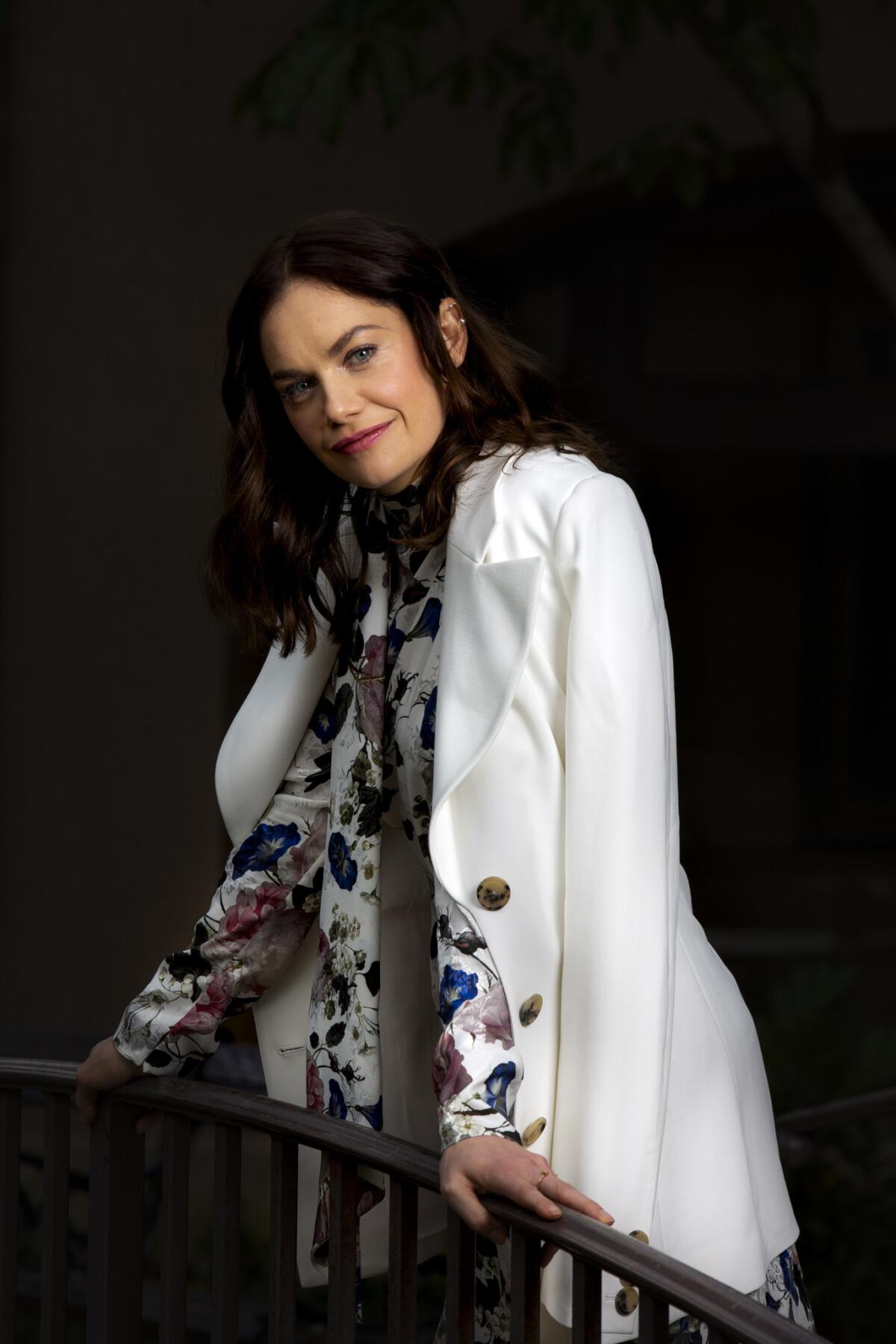Ruth Wilson on going bold in ‘Lear’ and her own secret family saga in ‘Mrs. Wilson’

- Share via
Reporting from New York — It’s nearly lunchtime on a Friday in downtown Manhattan, but Ruth Wilson is just sitting down to breakfast. Her meal schedule is all out of whack because she’s starring every night in a 3 1/2-hour production of “King Lear,” currently in previews at Broadway’s Cort Theatre: “You’ve got to work out how to eat,” she says cheekily, “or you’ll be farting everywhere.”
Wilson, who plays doomed Cordelia and The Fool in “Lear,” has also depicted a psychopathic genius in the BBC series “Luther,” a woman clouded by grief in Showtime’s “The Affair,” a 19th-century governess who falls for her brooding master in the BBC’s “Jane Eyre,” and a submissive wife torn between her brutish husband and neurotic sister in a London production of “A Streetcar Named Desire.”
Yet none of these intense, enigmatic roles prepared the actress for her trickiest job to date: portraying her paternal grandmother, Alison, in “Mrs. Wilson,” a “Masterpiece” miniseries premiering Sunday on PBS, which she also executive produced.
“It was the most stressful thing I have done in my life,” says Wilson, laughing with bemusement as she explains how she wound up with a thyroid issue because of all the pressure. “I need a week in a Zen monastery.”
Alison was a fixture in Wilson’s childhood, living around the corner from her family in the London suburbs, coming over for lunch on Sundays and often picking up Wilson and her three older brothers from school. But she was also emotionally distant, introverted and devout — not “the warm granny who gave you a hug,” Wilson recalls. “You never felt that comfortable around her.”
Her grandfather, who died years before she was born, was even more of a mystery. “Dad never spoke of his dad. I had three grandparents and that was kind of it. I found a picture of him when I was about 10 and rooting through my dad’s cabinet, and I said, ‘Who is this?’ ‘That’s my dad.’ No more discussion.”
When she was 16 or 17, Wilson began to understand her grandmother’s detachment. That’s when Alison shared a private memoir with her family that revealed a secret she’d kept hidden for decades: Her late husband, Alexander, a spy novelist and intelligence agent 25 years her senior, was a bigamist who had never actually divorced his first wife. They’d met during World War II, when Alison was a secretary at MI6.
Alison discovered the truth following his sudden death in 1963, but chose to keep it from her two sons until they were middle-aged men with families of their own, and relied on her faith to cope.
And there were more revelations to come.
After Alison died in 2005, the family learned that Alexander (known as Alec) actually had two more wives and seven children in total, meaning Wilson had dozens of aunts, uncles and cousins she’d never met. Even his career at MI6 has been cast into doubt. The Wilsons remain unsure whether he was a chronic fabulist who was fired from the intelligence agency, leaving Alison and their sons destitute, or, as he claimed, a secret agent committed to an especially elaborate cover.
“The story kept unraveling,” says Wilson, “and it keeps unraveling.”
ALSO: ‘The Affair’ star Ruth Wilson is a risk-taker who’s ready to lighten up »
Discovering her grandfather’s secrets, Wilson says, has “made sense of things that never made sense before,” especially her acting career, which once seemed like “a weird and obtuse” choice in a family of jocks. “Then I find out my grandfather was a writer who wrote 27 books and set up acting troupes with two of the families. His attachment to creativity and language and storytelling — that was what connected the dots for me and made me feel like not such a weirdo.”
Shortly after graduating from the London Academy of Dramatic Arts, Wilson scored the lead in the BBC’s 2006 miniseries version of “Jane Eyre,” adapted from Charlotte Bronte’s Gothic classic. She soon made an impression in “Luther” as charismatic killer Alice Morgan.
Her major American breakthrough came with “The Affair,” which told the “Rashomon”-style story of an extramarital relationship from multiple perspectives. She won a Golden Globe for her performance as (another) Alison, a Montauk waitress mourning the loss of a child when she gets involved with a struggling Brooklyn writer (Dominic West). Wilson abruptly left “The Affair” last year, and firmly but politely declines to discuss her departure. But later in the conversation, she says she’s wary of committing to another ongoing series because “storytelling is hard over a long period, with an open end.”
ALSO: Dominic West and Ruth Wilson of ‘The Affair’ lighten up for a chat »
Bringing her family saga to the screen was another thorny process. Any time she told people in the industry about it, the response would be the same: “You should tell this story.” But she found that everyone in L.A. wanted to focus on her grandfather — the kind of charming, enigmatic con man that Hollywood, and especially prestige TV, finds endlessly fascinating.
Wilson, however, was determined to focus on her grandmother’s dramatic journey. “The women,” she says, “are as deeply interesting in their connection to him and their capacity to survive throughout that and maintain a family.”
As Alison described in her memoir, about two weeks after Alec’s death, Jesus came to her in a vision. “She felt this warmth literally come up through her. I mean, to me, it reads literally almost orgasmic,” Wilson says. She converted to Catholicism, her late husband’s religion, took vows of poverty and chastity and essentially lived as a secular nun.
“People will interpret it as a breakdown,” Wilson says. “Whatever. It was a form of survival for her.”
Eventually, the BBC gave a greenlight to “Mrs. Wilson,” which aired in the U.K. in November and costars Iain Glen (“Game of Thrones”) as Alec and Keeley Hawes (“Bodyguard”) as his second wife, Dorothy. The three-hour miniseries is a detective story told through Alison’s eyes as she attempts to uncover the truth.
While “Mrs. Wilson” takes some license with the story, blending details from Alison’s memoir with revelations that came after her death, in her role as an executive producer Wilson didn’t shy away from the more unsavory details of her family history. She insisted on showing how her naive grandmother was complicit in Alec’s deception. “You must have some amazing capacity not to see things, or to refuse to see things,” in order to be duped so dramatically, she says.
“She basically said to me, Anna, don’t sanitize it,” says screenwriter Anna Symon. There are some people who wouldn’t be comfortable with this story out in the world. She was very, very keen that the story was told in the boldest way, warts and all.”
Once the project was a go, Wilson faced the formidable task of portraying someone she knew but whose voice and gestures she could only dimly recall.
“It was a bit inhibiting at first,” says Wilson, who doesn’t particularly resemble Alison (she gets her distinctive eyebrows from her other grandmother). The production schedule also jumped around, meaning she might be playing the youthful, optimistic Alison of the 1940s in the morning and the intense, pious Alison of the 1960s right after lunch. Then came the deeply weird experience of giving birth to her own father on screen.
“You just go, ‘Where am I? What am I doing?’ Every time the clapper board goes Mrs. Wilson, it’s like, oh God, we’re actually doing this.”
Wilson has approached her dual roles as Cordelia and The Fool in “King Lear,” with similar gusto. The gender-blind production, which opens April 4, features the ever-formidable Glenda Jackson in the title role and Jayne Houdyshell as Gloucester.
“I don’t think ‘daunted’ is something I would put in the vocabulary of Ruth Wilson,” says “Lear” director Sam Gold, whose recent off-Broadway stagings of “Othello” and “Hamlet” earned raves. He made the unusual choice to pair The Fool and Cordelia because “they both speak truth to power,” he says, “and that is something I know Ruth has in her — the glimmer of rebellious energy and strength and power and dexterity.”
At rehearsal for “King Lear” days earlier, Wilson seemed unfazed by her surroundings: a golden-throne room that looked like a Trumpian fever dream. As a string quartet played a discordant score by Philip Glass, Wilson, wearing sweats and sneakers, stood on a chair and put a noose around her neck — an idea she and Gold were trying out but ultimately deemed too complicated. Between setups, she laughed readily with costar Pedro Pascal.
“I’m really drawn to actors that I consider co-directors,” says Gold.
REVIEW: ‘The Little Stranger,’ a 1940s ghost story starring Domhnall Gleeson and Ruth Wilson »
Wilson, who earned a Tony nomination for her work in “Constellations” in 2015, has found it exciting to unleash her “idiot self” on stage. (She also sings, but since she’s playing The fool, “I can be a bit crap,” she says.)
“King Lear” is Wilson’s first professional turn at Shakespeare, and she talks about the Bard with a tone that, for a classically trained British actor, borders on blasphemy.
“Everyone’s like, ‘You must do some Shakespeare.’ Why? It’s done so often in our country and treated with such reverence. And often it’s done so badly. I’m always a bit averse. If I have to go see a Shakespeare, I’m often like …,” she groans.
The humorous mini-diatribe is typical of Wilson, who is not timid about sharing her opinion on a wide array of subjects, including her accidental habit of playing characters called Alice or Alison (“I hate the name”), Brexit (“Everyone’s completely insane at the moment”), streaming network algorithms (“mob rule”), and her grandfather’s novels (“a bit racist”).
This self-assurance has been crucial during a period of growth and transition in her career. In addition to reprising her role in “Luther” in June, she will be seen in the much-anticipated fantasy series “His Dark Materials” for HBO later this year, and is working on a podcast she can’t say much about at this point.
“If something’s too familiar,” she says, “I feel a bit bored.”

‘Mrs. Wilson’
Where: KOCE
When: 9 p.m. Sunday
Rating: TV-14 (may be unsuitable for children under the age of 14)
See the most-read stories in Entertainment this hour »
Follow me @MeredithBlake
More to Read
The complete guide to home viewing
Get Screen Gab for everything about the TV shows and streaming movies everyone’s talking about.
You may occasionally receive promotional content from the Los Angeles Times.






